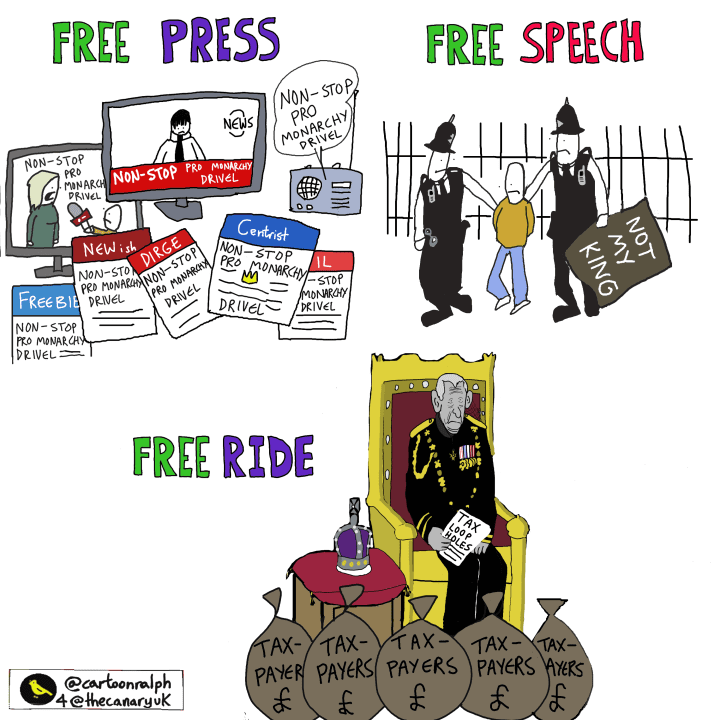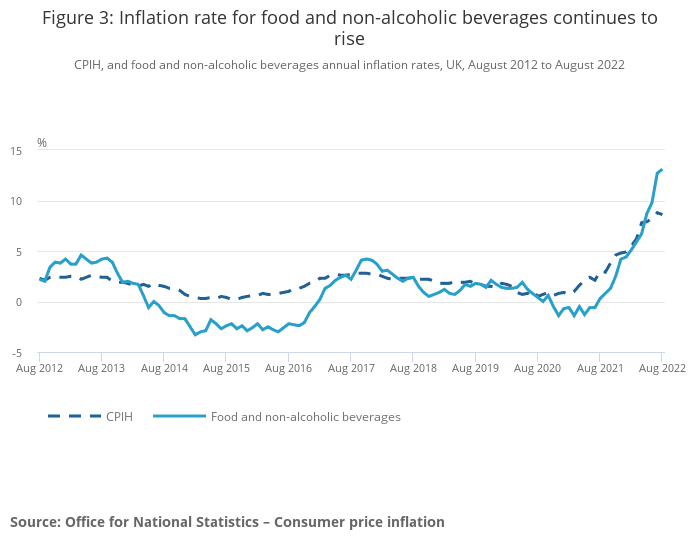A possible indication that the Liz Truss government is already under pressure came with the announcement that the so-called Bill of Rights has been shelved. Though her government can’t blame that on the death of the queen. Because news of the bill’s fate came only one day after Truss took up the post of prime minister.
Nevertheless, Truss’s war on UK workers remains unabated, and it’s being waged on a number of fronts.
Anti-rights bill shelved
On 7 September, the Law Gazette confirmed that the Tory flagship Bill of Rights (BoR) has been shelved.
The Canary previously reported that, if enacted, the bill would replace the 1998 Human Rights Act. That act incorporates rights defined by the European Convention on Human Rights (ECHR). It’s worth noting that the ECHR isn’t affiliated with the EU but was set up by the UK and other countries to protect citizens against injustices by governments and other powerful institutions.
The BoR would have made it easier to organise deportations and to further curb protests. It would also have made it more difficult to access justice regarding human rights breaches from overseas military/peacekeeping operations.
However, there’s nothing to stop the government from transferring parts of the bill to other bills.
Human rights NGO Liberty dubbed the bill the “Rights Removal Bill” and tweeted how more than 120 organisations opposed it:
But Truss has other plans
Truss has also signaled her intention to restrict workers’ rights by other means. It’s been described as a “bonfire” of rights that aims to destroy not just employment but also environmental protections. Laws and regulations carried over from the EU would be “evaluated on the basis of whether it supports UK growth or boosts investment”. They would then be replaced by new Tory laws. And those laws which do not get replaced would be ditched.
Trades Union Congress (TUC) general secretary Frances O’Grady pointed out:
Holiday pay, equal pay for women and men, safe limits on working hours and parental leave are just a few of the rights underpinned by retained EU law. These are vital workplace protections and rights – not nice-to-haves.
Peter Stefanovic posted a video explaining that the Tories want to review the number of hours in a working week, as well as re-examine annual leave entitlements. Stefanovic adds how the government can get away with making these changes without having to resort to primary legislation:
Limiting powers of trade unions
Let us not forget that the eight-hour work day came about because unions fought for it. But as one 2004 article points out, an erosion of such rights has been taking place over many years.
For example, the 1980 Employment Act:
Abolished trade union recognition rights and restricted picket line numbers to only six.
Made solidarity action illegal.
Severely restricted the closed shop, which now had to be approved by 85% of the workforce.
That was followed by many more acts, aimed at curbing union powers, which resulted in:
a large decline in union membership, massive growth in the power of private firms and global capital which has lobbied (bribed) successive governments relentlessly.
More restrictions on unions
Also, as The Canary previously pointed out, it seems Truss is planning to bring in minimum service levels on critical infrastructure during strikes. In other words, the government will facilitate scab action, just as Margaret Thatcher did with the Nottinghamshire miners.
Rail, Maritime and Transport (RMT) union general secretary Mick Lynch said Truss:
is proposing to make effective trade unionism illegal in Britain and to rob working people of a key democratic right. If these proposals become law, there will be the biggest resistance mounted by the entire trade union movement, rivalling the General Strike of 1926, the Suffragettes and Chartism.
Kwasi Kwarteng, now chancellor, boasted in July how the wheels had already been set in motion with regard to these changes:
Truss also wants to impose other restrictions, such as increasing the minimum notice period for strike action from two to four weeks.
Legal protections under threat
All these moves by the Tories appear at odds with protections provided by international bodies, to which the UK is signatory.
A 2012 report on trade union rights, published by the Institute of Employment Rights, lists these international laws and organisations. They include: the UN Declaration of Human Rights, the International Labour Organisation, the European Social Charter, the Council of Europe’s Social Charter, and Articles 12 and 28 of the European Convention on Human Rights (ECHR).
For example, the latter states:
The European Court of Human Rights (ECtHR) has made clear that Article 11 includes the right to bargain collectively, the right to strike, the right of unions to decide their own constitutions and membership, and the right of members not to be penalised for seeking union support.
But the Tories are threatening to pull the UK out of the ECHR, which is overseen by the European Court of Human Rights. Should that happen, it will make it easier for Truss to dismantle more rights. And should Truss take the UK out of the ECHR, that move could pave the way for other pull-outs.
The richest benefit most
On another front of the class war, Truss is happy to continue Tory tradition by giving to the rich and taking from the poor.
For example, her reduction in national insurance from 13.25% to 12% disproportionately benefits the wealthy and provides hardly any extra money for the poor. Specifically, based on Institute for Fiscal Studies figures, highest earners will be 250 times better off from this reduction than the poorest. Those at the bottom will get a miserly £7.66 extra a year, while the richest 10% of people will get an average of £1,801.
Truss told BBC presenter Laura Kuenssberg that this approach was “fair”:
Pensioners, including working pensioners over pension age, don’t pay national insurance. So they will not gain any benefit from the Tories’ cut.
UK energy bills freeze is a rip off
Then there’s the issue of soaring energy bills. Truss is adamant she will borrow whatever money is needed to freeze the energy bills at around £2.5k. That’s around £500 more than the current price cap of £1,971.
The Canary’s Steve Topple says Truss’s plan will likely lead to thousands of deaths and more poverty:
Even with Liz Truss’s plan to change the October energy price cap to £2,500, this is still an increase of over £1,200 (or 95%) in 14 months. For context, in winter 2019/2020 around 8,500 people died due to cold homes. This was when the energy price cap was under £1,200. Deaths this winter are likely to be far higher, with poverty also set to rocket.
As for the tens of billions to pay for the freeze, Truss made it clear she doesn’t want to pass that on to the energy companies via, say, a windfall tax. Instead, she’s gifting billions to those companies on top of the billions of profits they already make. And it’s taxpayers who will pay over decades for the cost of that gift.
Truss also stated that the freeze on bills will last for two years. What happens after that is unclear.
Howard Beckett of Unite says that, compared to certain other countries, we’re being ripped off:
Resistance
Meanwhile, strikes by unions have been put on hold following the queen’s death. It’s assumed current strikes and ballots will resume after the pause. They include industrial action by the Communication Workers Union, the Criminal Bar Association, RMT and Unite. The Fire Brigades Union is to ballot its members on strike action, as is the Royal College of Nursing.
CWU general secretary Dave Ward unequivocally stated that the trade union movement will fight back should the Truss government attempt to “stamp out the working class movement”:
RMT head Mick Lynch said that if Truss proceeds with her plans to curb workers rights, he would give his support to a general strike. So it looks like Truss will be under even more pressure.
What we are witnessing is no less than a class war that’s being waged by the few against the many. Now is the time to organise – and fight back.
Featured image via Flickr / Gareth Milner cropped 770×403 pixels
By Tom Coburg
This post was originally published on The Canary.



(@LMGM) September 26, 2022
(@louise_latran) September 26, 2022




 Make no mistake, we are angry. This Government has today launched an attack on nature. We don’t use the words that follow lightly. We are entering uncharted territory. Please read this thread. 1/13
Make no mistake, we are angry. This Government has today launched an attack on nature. We don’t use the words that follow lightly. We are entering uncharted territory. Please read this thread. 1/13  (@RSPBEngland)
(@RSPBEngland) 
 We have a plan for economic growth.
We have a plan for economic growth.  It is not true to claim we are attacking nature nor going back on our commitments.
It is not true to claim we are attacking nature nor going back on our commitments.  We have legislated through the Environment Act and will continue to improve our regulations and wildlife laws in line with our ambitious vision.
We have legislated through the Environment Act and will continue to improve our regulations and wildlife laws in line with our ambitious vision. "Britain Is The People" (FB Pg) (@Britain_People)
"Britain Is The People" (FB Pg) (@Britain_People) 

 Northern Affiliated media (@trendylefty)
Northern Affiliated media (@trendylefty)  #NotMovingOn (@THemingford)
#NotMovingOn (@THemingford) 




 (@_JD_Black)
(@_JD_Black) 






 (@sparklykitten)
(@sparklykitten) 